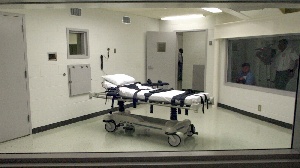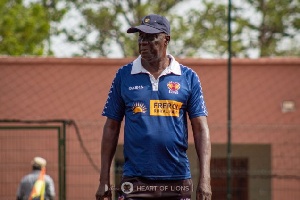- Home - News
- Elections 2024
- News Archive
- Crime & Punishment
- Politics
- Regional
- Editorial
- Health
- Ghanaians Abroad
- Tabloid
- Africa
- Religion
- Photo Archives
- Press Release
General News of Friday, 11 April 2025
Source: www.ghanawebbers.com
Global Execution Surge casts shadow over Africa's Capital Punishment Debate
Amnesty International Report on State Executions
Amnesty International has released a new report. It warns that state executions worldwide have reached record highs. This is the first time in a decade that this has happened.
In 2024, visible executions exceeded 1,500. Iran, Iraq, and Saudi Arabia accounted for most of these executions.
The United States executed 25 people this year. Meanwhile, Africa faces a dilemma over capital punishment.
Despite the increase in executions, there is some hope. The number of countries using the death penalty remains low at 15. This is the second consecutive year at this historic low.
Death Penalty in Africa: A Mixed Picture
The situation regarding the death penalty varies across Africa. Many countries have abolished capital punishment legally or practically. However, some still retain it in their laws.
For example, Sierra Leone recently abolished the death penalty for all crimes. In contrast, Egypt continues to execute individuals despite not being among the top executioners listed by Amnesty.
This disparity reflects Africa's struggle with colonial legacies and modern human rights norms. The continent is navigating vastly different socio-political contexts.
Africa could play a role in balancing global execution trends. If not careful, it might fall into a "doom loop" influenced by Middle Eastern practices.
Global Trends and Human Rights Standards
Amnesty's report highlights a rise in executions globally but also notes fewer executing countries overall. This trend supports movements advocating for abolition worldwide.
Changing human rights standards are influencing views on capital punishment as degrading and inhumane. African nations are not immune to these pressures either.
International human rights organizations urge African states to align their laws with global norms. The low number of executing countries may encourage abolitionist movements across Africa.
Socio-Political Context of Capital Punishment
Socio-political factors heavily influence the death penalty debate in Africa. Crime rates and public opinion shape policies surrounding capital punishment.
Retentionist states argue that the death penalty deters violent crime and reflects public will. Critics counter these claims by highlighting judicial errors and wrongful executions.
The rising number of executions raises concerns about judicial transparency in major Global South powers operating within Africa.
This situation may empower groups advocating against the death penalty within their nations.
Influence of Regional Institutions
The African Union (AU) plays a role in discussions about capital punishment but lacks a clear stance against it. However, there is general attention to human rights and good governance within AU frameworks that support abolition efforts.
Diverging trends from Amnesty's report—rising executions alongside fewer executioners—may spark renewed dialogue across Africa. This could strengthen arguments for reconsidering membership among executing nations within the AU.
Such discussions can demonstrate that security and justice can exist without capital punishment—a powerful message for humanity as well as African nations re-evaluate their positions on this issue.
Ghana’s Perspective on Global Execution Trends
Ghanaians should be concerned about the global surge in state executions. Although Ghana is not geographically close to major execution centers, this trend threatens universal human rights principles.
As a democratic nation committed to rule of law, Ghana must take notice of these developments carefully.
Despite being associated with capital punishment historically, Ghana faces challenges as other countries move toward abolition while retaining such practices themselves—like the United States does today.
This international context may inadvertently support retentionist arguments while undermining Ghana’s progressive values aimed at fostering an inclusive society.
Analysis by Nana Karikari, Senior International Affairs and Political Analyst











